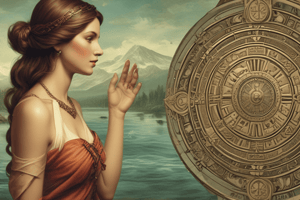Podcast
Questions and Answers
What defines static settlements?
What defines static settlements?
- Regions ruled by an empire
- Places where people live in one location (correct)
- Areas where people hunt and gather
- Locations that change frequently
What is the belief in multiple gods called?
What is the belief in multiple gods called?
- Monotheism
- Polytheism (correct)
- Atheism
- Trinitarianism
Which of the following best describes an empire?
Which of the following best describes an empire?
- A single territory under local governance
- A collection of independent states
- A region governed by democratic principles
- A group of countries controlled by one powerful ruler (correct)
What best defines a legacy?
What best defines a legacy?
Which of the following is considered a primary source?
Which of the following is considered a primary source?
What does AD stand for in historical dating?
What does AD stand for in historical dating?
During which period did people primarily live in groups of 30-50 and depend on animals for survival?
During which period did people primarily live in groups of 30-50 and depend on animals for survival?
What significant development began during the Age of Tribes?
What significant development began during the Age of Tribes?
Which statement about the Age of Kingdoms is true?
Which statement about the Age of Kingdoms is true?
What transition was observed by the end of the 20th century regarding countries?
What transition was observed by the end of the 20th century regarding countries?
What is a common interpretation of the archaeological findings during the Age of Empires?
What is a common interpretation of the archaeological findings during the Age of Empires?
What role do historians play in understanding the past?
What role do historians play in understanding the past?
What term refers to an idea or a way of thinking about something?
What term refers to an idea or a way of thinking about something?
Which term describes a group of countries controlled by a single government?
Which term describes a group of countries controlled by a single government?
What is the belief in one god called?
What is the belief in one god called?
What describes when something remains the same over time?
What describes when something remains the same over time?
Which term refers to original materials from a historical event or time?
Which term refers to original materials from a historical event or time?
What type of government is led by a king or queen?
What type of government is led by a king or queen?
What is the term for a region controlled by a more powerful country?
What is the term for a region controlled by a more powerful country?
What does the term 'millennium' refer to in historical context?
What does the term 'millennium' refer to in historical context?
During which period did static settlements first begin to emerge?
During which period did static settlements first begin to emerge?
What was a primary economic activity during the Age of Kingdoms?
What was a primary economic activity during the Age of Kingdoms?
What significant change in belief occurred during the Age of Empires?
What significant change in belief occurred during the Age of Empires?
What does the term 'Representations' refer to in the context of history?
What does the term 'Representations' refer to in the context of history?
What major social change occurred at the end of the 20th century?
What major social change occurred at the end of the 20th century?
In what ways do historians benefit from the use of concepts?
In what ways do historians benefit from the use of concepts?
Which of the following best describes the characteristics of the Age of Bands?
Which of the following best describes the characteristics of the Age of Bands?
Flashcards are hidden until you start studying
Study Notes
Dating Systems
- AD is used for dates after the believed birth of Jesus Christ and counts up the further you go from it.
- BC is used for dates before the birth of Jesus Christ and counts down the further you go from it.
Historical Periods
- A decade is 10 years, a century is 100 years, and a millennium is 1000 years.
- The Age of Bands refers to the period between 100,000 BC and 10,000 BC before the agricultural revolution.
- People lived in groups of 30-50 and were nomadic.
- They used basic tools and depended on animals for survival.
- The Age of Tribes lasted between 10,000 BC and 3000 BC.
- People began living in static settlements.
- Trade and agriculture started during this period.
- The Age of Kingdoms started around 3000 BC and lasted until 1500 AD.
- People still farmed and made goods at home.
- Polytheism (belief in many gods) emerged, with kingdoms sometimes containing several million people.
- The Age of Empires followed, spanning from 1500 AD to 1945.
- Factory production began.
- Some regions transitioned to monotheism (belief in one god).
- Empires often encompassed millions of people.
- By the end of the 20th century, most countries gained independence.
Historical Research
- Historians start their research by asking questions.
- To learn about the past, historians use different sources.
- Historians reach interpretations after completing their research.
- Historians have a role in presenting their findings.
Key Concepts
- Enquiries: Questions or investigations to find out more about something.
- Interpretations: The way people understand and explain information or events.
- Representations: How something is shown or depicted.
- Nomadic: People who move from place to place rather than living in one place all the time.
- Static Settlement: An area where people live and stay in one location.
- Concept: An idea or way of thinking about something.
- Change: When something becomes different from what it was before.
- Continuity: When something stays the same over time.
- Monarchy: A form of government where a king or queen is the head of state.
- Polytheism: The belief in many gods.
- Empire: A group of countries or territories controlled by one powerful ruler or government.
- Colony: A country or region controlled by a more powerful country.
- Legacy: Something handed down from the past, such as traditions, achievements, or ideas.
- Primary Sources: Original materials from the time or event being studied.
- Monotheism: The belief in only one god.
Dating Systems
- AD is used for dates after the year of Jesus Christ's birth.
- BC is used for dates before Jesus Christ's birth.
- The further from Jesus Christ's birth, the higher the AD number, and the lower the BC number.
- A decade represents 10 years, a century 100 years, and a millennium 1000 years.
The Historian's Process
- Historians start by asking questions to learn about the past.
- They rely on historical sources to gather information.
- After research, historians interpret their findings and form conclusions.
- Finally, they choose how to present their work, whether through writing, visual media, or other forms.
Age of Bands (100,000 BC - 10,000 BC)
- People lived in nomadic groups of 30-50 individuals.
- They relied on simple tools and hunted animals for survival.
Age of Tribes (10,000 BC - 3000 BC)
- People began to settle in fixed locations.
- They started trading goods and cultivating food.
Age of Kingdoms (3000 BC - 1500 AD)
- Kingdoms emerged, marking the beginning of organized political structures.
- People continued to farm and produce goods at home.
- Polytheism became widespread with the belief in multiple gods.
- Kingdoms could encompass millions of people.
Age of Empires (1500 - 1945)
- Large empires began to form, controlling vast territories and populations.
- Industrial production rose, with goods being manufactured in factories.
- Monotheism, the belief in one God, became prominent in some regions, while others rejected religious beliefs.
- Empires could contain millions of people.
Age of National Independence (20th Century onwards)
- Countries started demanding self-governance.
- Most nations achieved full independence by the end of the 20th century.
Key Concepts and Glossary
- Enquiries: Investigating and asking questions to gain knowledge.
- Interpretations: How individuals understand and explain information or events.
- Representations: How information is displayed or depicted, for example, through art or written accounts.
- Nomadic: Moving from place to place, often in search of food or resources.
- Static Settlements: Fixed locations where people establish residences and communities.
- Concept: An idea or a way of understanding a particular topic.
- Change: Alterations or transformations over time.
- Continuity: Aspects that remain consistent over time.
- Monarchy: A system of government with a king or queen as the head of state.
- Polytheism: Belief in multiple gods.
- Empire: A large group of countries or territories ruled by a single entity.
- Colony: A territory controlled by a more powerful country.
- Legacy: Something passed down from the past, including traditions, achievements, and ideas.
- Primary Sources: Original materials created during the time period being studied, such as letters, photos, or diaries.
- Monotheism: Belief in one God.
Studying That Suits You
Use AI to generate personalized quizzes and flashcards to suit your learning preferences.




